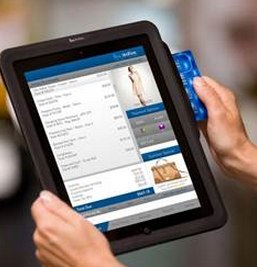VeriFone is no small player in the payments world—the company, which is worth over $3 billion, is actually the largest provider of in-store credit card processing payments terminals in the U.S. But faced with the competitive strength of fast growing mobile payments company Square, as well as other players like PayPal, VeriFone is currently in an uphill battle to prove that it can be part of the future of payments for both retailers and consumers. We sat down With David Talach, the company’s head of strategic partnerships, and former head of product, to discuss how VeriFone plans to turn things around.
“Our internal strategy is way more well-thought thought out than the industry perceives us,” Talach explains. Besides the company’s in-store terminals, VeriFone also offers a Square competitor, Sail. And VeriFone has partnered with Isis on a mobile payments system, Google on NFC, and even PayPal.
Talach says the payments industry has gone through a “weird transformation that went from nobody loving it to everyone loving the market.” The challenge for VeriFone now is to get people to understand that the company isn’t just a hardware provider. “We don’t discriminate between Isis, PayPal or Visa or even retailers. We see ourselves as a commerce platform provider that is open to all technologies,” he explains.
The key for VeriFone’s future is in these partnerships, adding new technologies to VeriFone’s hardware and terminals. We hear the company is going to announce a deal with LevelUp, a carrier and card-agnostic payment and loyalty system. VeriFone is also reportedly in talks with online and mobile digital cash network Dwolla.
The company also sees huge opportunity in the retail market for its iPad cash register system and software, which competes with the Squares and Groupons of the world. Last year, VeriFone acquired Global Bay, a company that developed a software to help retailers use iPads as point of sale devices. VeriFone now offers a hardware and software for the iPod Touch, and the iPad that gives retailers access to NFC, credit card swiping, a barcode scanner and more. “We want to do everything a cash register does on a device, and integrate with stores’ backends,” says Talach.
As Square has shown, the in-store, mobile payments offering has a broad appeal. Everyone from mom and pop, independent stores to international retail chains are seeing the virtue in having a mobile payments solution. As Talach explains, there are three different types of merchants that VeriFone caters to: tier one retailers (large national brands); tier 2 retailers (smaller chains that have multiple stores but don’t have payments integrated with their backend inventory software) and tier 3 (micro merchants).
But while VeriFone offers Sail to appeal to the payments needs of smaller merchants, it sees the tier one and two retailers as having the “most value,” according to Talach. “We have strong relationships with with tier one and tier 2 merchants that Intuit and Square don’t have.”
While Sail has competitors in Intuit, Groupon and Square; the company doesn’t see as much heated competition amongst the tier one and tier two retailers. While Sail is still a “strategic effort that VeriFone is proud of,” Talach says there is less room to really do well in such a crowded space. “It’s tough to make money on aggregating a bunch of small transactions,” he says of services like Sail.
Square’s deal with a large merchant like Starbucks validates the fact that there is a huge opportunity in serving Tier 1 and Tier 2 businesses, he adds.
We may also see VeriFone being more acquisitive as well — last year, the company said it would spend as much as a $1 billion per year on acquisitions.
Can these partnerships and a mobile register system and software help put VeriFone in the innovation bucket? One thing is for sure — VeriFone needs to have a plan in place to get involved in the future of payments. The company’s stock has dropped by nearly 50 percent since April. And some are saying that Google and eBay could be eyeing VeriFone as an acquisition target.
Talach is optimistic about VeriFone’s future as a payments company. “Partnering with us is much more capital-efficient, whether you are a big company like PayPal, or a smaller startup,” he says.
